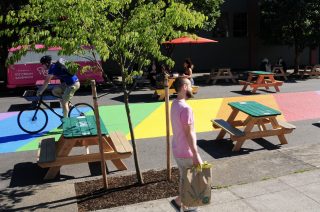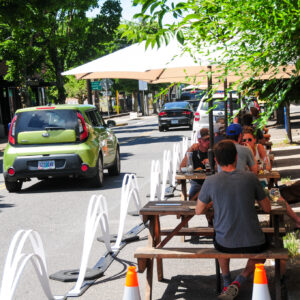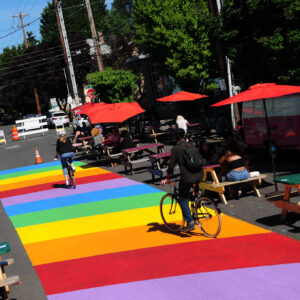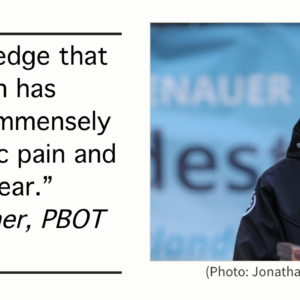
The current number one priority at Portland’s transportation bureau is a permit program that aims to help restaurants spread into the street so they can serve more people safely. The Healthy Business program is part of a larger Safe Streets Initiative that’s altering public right-of-way to improve safety and create more space for physically-distanced commerce.
By some accounts the program is working well. Since it was launched at the end of May, the Portland Bureau of Transportation (PBOT) says they’ve issued well over 200 permits so far and rave reviews are coming in for the street dining plazas.
But is the program working for everyone? Are Black-owned businesses getting a fair shot? And is PBOT’s execution of the program living up to their pledge to be antiracist?
Advertisement

(Photo: Jonathan Maus/BikePortland)
This ambitious program is a difficult test for an agency reeling from pandemic-related budget cuts and staffing issues. It’s also a test of how — or if — PBOT is putting their commitment to equity and being an antiracist organization into action. Transportation and racism are closely intertwined. Policies and projects that change our built environment and dictate how and where we move around can either uphold systems of oppression that have unfair impacts on people of color, or help dismantle them.
It’s not enough to be “not racist” and aware of racist policies. To dismantle racism, people and organizations need to be antiracist and work proactively to change racist policies and stop racist behaviors.
An article published yesterday by Street Roots, claimed that the street dining permit program has left some Black-owned businesses behind. The article stated that four of six businesses they contacted that are owned by Black, Indigenous and people of color (BIPOC) didn’t expect to benefit from the program and two hadn’t even heard of it.
Yesterday I asked two members of PBOT’s communications team about the Street Roots story and the equity implications of the Safe Streets initiative.
“There’s work being done right now to continue to move this forward. We see this is a marathon, not a sprint.”
— Hannah Schafer, PBOT
Public Information Officer Dylan Rivera and Communications Coordinator Hannah Schafer acknowledged the bureau has a lot of work to do around racism and equity; but they said the article wasn’t a fair characterization of their work on the Healthy Business program. Rivera pointed out that 43 permits have been issued to applicants who identify as BIPOC and 21 more are in process of being granted. If we assume those 21 will be granted (and PBOT says they’ve yet to deny any grantee), that would mean about one-quarter of the permits are in the hands of BIPOC-owned businesses.
Rivera also added that some of the businesses in the Street Roots story have received permits. Atlas Pizza has two permits and Deadstock Coffee’s permit is set to become effective this weekend. (You can see a map of all permit locations here.)
Even so, PBOT’s lack of established relationships with Black-owned businesses is making it harder to connect with them during this crisis (the comments about a lack of trust and skepticism toward PBOT in the Street Roots story are a big red flag) and the agency is scrambling to make them aware of the program. They’ve called over 100 businesses directly. “We’ve taken our staff in charge of permits for sidewalk cafes and we’ve sent them communications staff to phone-bank BIPOC-owned businesses,” Rivera said. “We’re using public lists to call them and make offers directly and email them the information about our assistance. It’s been a big push and we’ve tried to be sensitive to folks’ information overload while trying to go above and beyond where we’ve ever been in the past.”
In the past PBOT didn’t ask permit applicants for racial identity information. Now they do. “That helps us understand who we’re reaching and who we’re not reaching,” Rivera said. He added that the outreach to Black-owned businesses is, “Part of the consciousness and awareness-building we need to do more of to make our programs more accessible.”
Advertisement
This is part of a bureau-wide shift in racial awareness.
At a June 18th meeting of PBOT’s budget committee, Director Chris Warner said (according to meeting minutes), “We’re having a lot of conversations about how we can support Black Portland. We’re re-imagining the ways we use the right-of-way and how we can get beyond infrastructure safety, but also personal safety. A lot of these tragedies happen in the streets, the transportation system has been ingrained in racism and discrimination against Black people.”
Warner then referred to a bureau-wide meeting of about 80 staffers and managers that took place immediately following the death of George Floyd in Minneapolis on May 25th. Schafer was at that meeting. She recalled that, “People were talking about personal experiences and made themselves vulnerable in a way that hasn’t ever happened before and that has empowered people to take their work and really push it in a stronger way than they might have had before.”
What about being an antiracist organization? How has that mindset changed how PBOT does business? Schafer said it’s a work in progress and that recent events have been like an “Energizer battery pack got attached to a lot of the initiatives already in place at PBOT.” “I’m not sure you’re going to see it today,” she added, “I would say those conversations are ongoing and deep conversations and there’s work being done right now to continue to move this forward. We see this as a marathon, not a sprint.”
— Jonathan Maus: (503) 706-8804, @jonathan_maus on Twitter and jonathan@bikeportland.org
— Get our headlines delivered to your inbox.
— Support this independent community media outlet with a one-time contribution or monthly subscription.







Thanks for reading.
BikePortland has served this community with independent community journalism since 2005. We rely on subscriptions from readers like you to survive. Your financial support is vital in keeping this valuable resource alive and well.
Please subscribe today to strengthen and expand our work.
One permit in all of East Portland, a sports bar on Sandy in Parkrose. Which means PBOT should be actively implementing pop-up buffered bike lanes all over East Portland. What’s been their progress so far?
We see this as a marathon, not a sprint.
Like most PBOT projects east of 82nd Ave., they’ll have to wait until the rest of the city finishes the marathon before attention is given to east Portland.
So January 42nd of never, as usual?
Thanks for continuing on this path, Jonathan. Love to read your reporting from afar (i’m in NYC, but portland bike/streets/antiracism work is important to me).
One of the best things PBOT could do for East Portland businesses is build protected bike lanes that lead there from inner Portland. I’d love to bike to some of the amazing ethnic places out there more, but just don’t feel safe riding past 82nd-ish.
Don’t understand this sheepish kind of thinking. No we’re not The Netherlands and unlikely to ever be in terms of bike infrastructure but there are some great ways to go East. Burnside is relatively slow moving due to the Max Line east of 205, and an “ok” bike lane goes out 100 blocks past 82nd. Hook up to it in the 70’s via the Davis Greenway. It’s ok to ride; really! And try a great way out to Gresham via the well marked Market & Mill dogleg route. Halsey’s getting pretty good too east of 205. I’m the first to advocate for more and better routes but sometimes I wonder if people would rather just complain. Grab the bike/ped maps PDOT gives away and seek out some adventure rides in all directions out of the Portland core this summer.
And once you get to East Portland, there’s no shortage of interesting places to ride. San Rafael from 148th to 160th is one of the most beautiful streets in Portland. The DC8 crash site is on a gravel section on 157th just south of Glisan. And getting from there to the Springwater is doable, as long as you enjoy navigating a series of residential suburban mazes to get there.
But the reality of East Portland is that most people, poor and otherwise, live in apartments that line the main streets near all those ethnic businesses, where protected bike lanes are most desperately needed. The suburban sprawl is entirely off the main drag, lots of single-family houses (often with multiple families within them) and numerous interesting churches, interspersed with barren parks and enormous public schools. And usually no sidewalks or huge sidewalk gaps.
Remember when you said you couldn’t be racist because you “don’t see color”?
Remember when you allowed a person (a white straight male) to write two articles about being “oppressed” by cars? The images in those articles included a person on a bike aiming a gun at a person in a car. The “author” of the article then wrote back to a bunch of commentators with not nice replies ( on your site).
Remember when you said said ”the bike community is the most underserved community”? This happened while same sex marriage was still not legal? Yet you were married.
Remember when you thought about it was fine for a bunch of white people to have “Freedom Rides” because they wanted to go mountain biking and you posted that article? But then you realized why it was bad to do that.
Remember when you were fine with a commenter of this site say he knows what it’s like to be black because he rides a bike? This was during the Williams new bike lane discussion.
You have to deal with your straight white male guilt better than this. Riding a bike is a choice. But it’s an excellent choice (if you have that option, which sometimes people forget about that). More people are riding them now and it’s great to see. Unfortunately it took a pandemic and not your whining and civil rights appropriation to get Portland to that point.
[I know I’m going to get downvoted, but we know who is going to downvote me].
You know that article you wrote 30 years ago? The one you now acknowledge was wrong? You shouldn’t have written it, and you don’t deserve your job because of it. How dare you share an opinion in public. You should be ashamed of learning, growing, and trying to be a better person. Nothing you do matters because you’re wrong and you’ll always have been wrong.
I hate it when forms ask for my race. If there’s any possible way to avoid answering, I will take it. Nothing good ever comes from advertising your race on an application.